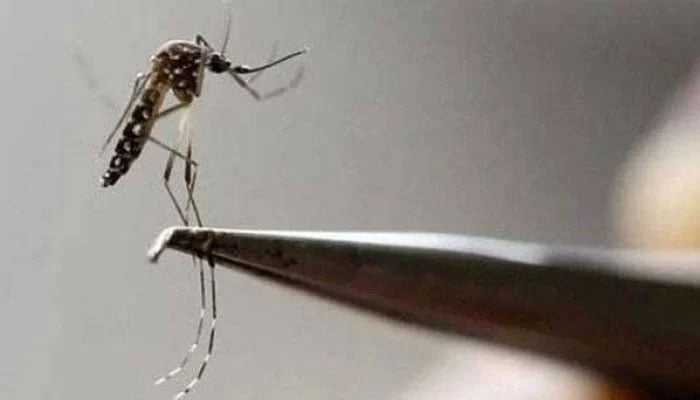Dengue outbreak comes to its seasonal end
Rawalpindi: Not a single case of dengue fever has been reported at any of the public and private sector healthcare facilities in Rawalpindi district in the last two days hinting that the outbreak of the infection that hit population hard in scattered areas of the twin cities of Islamabad and Rawalpindi has come to its seasonal close.
Data collected by ‘The News’ on Saturday has revealed that that in the last 48 hours, no case of dengue fever has been confirmed positive from Rawalpindi while in the last two weeks, only 26 individuals from the district have tested positive for dengue fever. It is important that the dengue fever outbreak has already faded away in Islamabad Capital Territory.
According to health experts, there are chances of sporadic cases of the infection for another week or so but the outbreak has come to its seasonal close after the fall in mercury in the region. Data also reveals that the three allied hospitals in Rawalpindi including Holy Family Hospital, Benazir Bhutto Hospital and Rawalpindi Teaching Hospital have received less
than 20 patients in the last two weeks.
According to data provided by the district health authority Rawalpindi, a total of 6607 patients from the district have tested positive for dengue fever so far this year of which as many as 11 died of the infection. On Saturday, there were only seven patients undergoing treatment at various hospitals in Rawalpindi including three at HFH and one at BBH.
It is worth mentioning here that to date, a total of well over 10000 patients have been confirmed positive for dengue fever from this region of the country of which over 3,500 reached various healthcare facilities from the federal capital while over 6,600 were residents of Rawalpindi.
Like the past 16 years, the dengue fever outbreak lost its intensity in the region mainly because of the fall in mercury level as the temperature has dropped down to below 20 degree Celsius. Health experts say that most of the confirmed patients of dengue fever reported recently were those who had been bitten by the dengue fever vector, the female mosquito ‘aedes aegypti’, seven to 10 days back.
Studies reveal that below 20 degrees Celsius, ‘aedes aegypti’ and ‘aedes albopictus’, the mosquitoes that cause dengue fever become unable to mount and feed on humans as their limbs and joints become weaker. Below 13.8 degrees centigrade, the mosquitoes’ activity, both egg laying and biting ability, comes to an end.
Despite the fall in temperature, health experts believe that individuals in this region of the country should continue following preventive measures to avoid mosquito bite and growth of mosquitoes within houses and offices.
-
 Natalie Dormer's Reaction To Sarah Ferguson's Epstein Links Resurfaces After 'The Lady' Release
Natalie Dormer's Reaction To Sarah Ferguson's Epstein Links Resurfaces After 'The Lady' Release -
 Did You Know Famous Windows 10 Background Was Shot In Real Life? Here's Story
Did You Know Famous Windows 10 Background Was Shot In Real Life? Here's Story -
 Pete Davidson's Baby Mommy Elsie Hewitt Reveals Why She 'hated' Being Pregnant
Pete Davidson's Baby Mommy Elsie Hewitt Reveals Why She 'hated' Being Pregnant -
 Harry, Meghan Show Royal Family How To Make Impact Without Public Money
Harry, Meghan Show Royal Family How To Make Impact Without Public Money -
 Hillary Clinton Set For Deposition Before House Committee Today In Jeffrey Epstein Investigation Case
Hillary Clinton Set For Deposition Before House Committee Today In Jeffrey Epstein Investigation Case -
 Samsung Galaxy S26 Ultra Debutes With Display That Blocks Side Viewers
Samsung Galaxy S26 Ultra Debutes With Display That Blocks Side Viewers -
 Fans In Shock As 'Smiling Friends' Creators End Cult-favourite Sitcom On Adult Swim: 'They Did It On Purpose'
Fans In Shock As 'Smiling Friends' Creators End Cult-favourite Sitcom On Adult Swim: 'They Did It On Purpose' -
 Meghan Markle Accused Of Mimicking Kate’s Iconic Style On 'pseudo Royal Tour'
Meghan Markle Accused Of Mimicking Kate’s Iconic Style On 'pseudo Royal Tour' -
 Social Media Addiction ‘like Smoking’: Mumsnet Calls For Under-16s Ban With Cigarette-style Warnings
Social Media Addiction ‘like Smoking’: Mumsnet Calls For Under-16s Ban With Cigarette-style Warnings -
 Andrew Mountbatten, Virginia Giuffre's Photos Attached To Buckingham Palace Gates
Andrew Mountbatten, Virginia Giuffre's Photos Attached To Buckingham Palace Gates -
 Everything We Know About Bruce Willis Frontotemporal Dementia
Everything We Know About Bruce Willis Frontotemporal Dementia -
 Singapore's Grab Plans AI-driven Expansion And New Services To Boost Profit By 2028
Singapore's Grab Plans AI-driven Expansion And New Services To Boost Profit By 2028 -
 Adele Reveals How She 'snapped Out Of' Sever Postpartum Depression
Adele Reveals How She 'snapped Out Of' Sever Postpartum Depression -
 ‘Chinamaxxing’ Explained: Inside Viral Gen Z Trend Taking Over TikTok And Instagram
‘Chinamaxxing’ Explained: Inside Viral Gen Z Trend Taking Over TikTok And Instagram -
 Fears Erupt About Sarah Ferguson Pulling A ‘Harry’ While Sitting On A King’s Ransom: ‘Her Leverage Still Stands’
Fears Erupt About Sarah Ferguson Pulling A ‘Harry’ While Sitting On A King’s Ransom: ‘Her Leverage Still Stands’ -
 Lisa Rinna Slams Andy Cohen For His Below The Belt Move: 'So Shady'
Lisa Rinna Slams Andy Cohen For His Below The Belt Move: 'So Shady'




